The Three Investigators. Nancy Drew. The Hardy Boys. The Famous Five. Encyclopedia Brown. Hanging out with that bunch of precocious nosy parkers during my formative years is definitely what started me on the path to a life of crime (fiction). Of all the kid detectives, the Three Investigators were the most influential – they had the best cosy/spooky cases and all the top gadgets – which is why they made this list, and enjoying solving cases alongside them spurred me on to pursue more complicated investigations with the likes of Sherlock Holmes, Hercule Poirot, Miss Marple, Father Brown, Mrs Bradley and the Black Widowers. While it’s been difficult to narrow the list down to five, I’d say the following titles have probably been the most influential when it comes to my love of a good mystery.
The Secret of Terror Castle by Robert Arthur
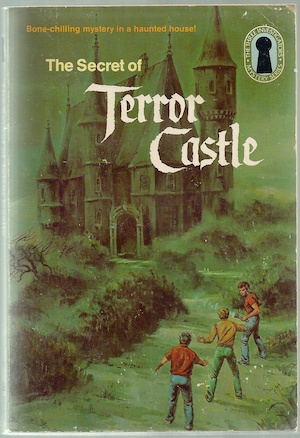
The Secret of Terror Castle, the first book in the Three Investigators series, introduces the trio of juvenile detectives who would go on to solve over 40 perplexing cases: Jupiter Jones (First Investigator), Pete Crenshaw (Second Investigator) and Bob Andrews (Records and Research). The motto of the Three Investigators is the laudable “We investigate anything”, which means that their cases often involve baffling and possibly paranormal phenomena, although the boys generally manage to uncover the clever, albeit mundane, explanations behind such seemingly supernatural events.
The Three Investigators’ first case sees them investigate eerie happenings at a haunted house originally built by silent film star Stephen Terrill, who was later said to have died in a terrible car accident. Through solving the mystery behind the hauntings, they hope to convince famed director Alfred Hitchcock that Terror Castle would make an excellent setting for his upcoming film. Perhaps more importantly, Hitchcock agrees to introduce the record of the case if the boys manage to prove that the house is really haunted.
Order now on Amazon
The Murder of Roger Ackroyd by Agatha Christie
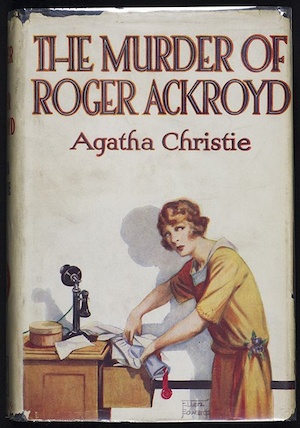
Intending to turn his back on crime and dedicate his little grey cells to the cultivation of marrows, Hercule Poirot has retired to the village King’s Abbot, which is also home to his friend Roger Ackroyd. Poirot doesn’t get to enjoy his requirement for long, however, as Ackroyd is murdered in peculiar circumstances and, seeing as there was no shortage of suspicious characters in Ackroyd’s house on the night in question, Poirot agrees to help the local police with the case. Ackroyd had been engaged to the widowed Mrs Ferrars, who had recently committed suicide after confessing to being blackmailed.
On the night of his death, Ackroyd received a letter from Mrs Ferrars and declared that he would read it while alone in his study. He was later found dead inside that locked room. As the trusty Hastings has moved to the Argentine with his new wife, The Murder of Roger Ackroyd is narrated by King’s Abbot GP Dr James Sheppard, who accompanies Poirot during the investigation and records the great detective’s progress in his diary. There’s a superb cast of characters and a very clever puzzle at the heart of the mystery, to say nothing of one of the best twists in crime fiction.
Order now on Amazon or Bookshop.org
The Name of the Rose by Umberto Eco
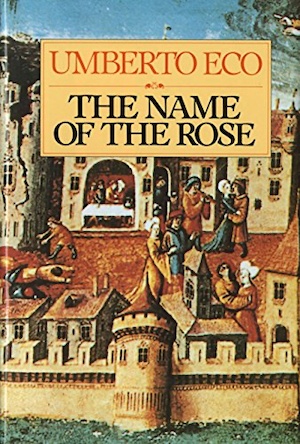
The Name of the Rose is a sublime work of historical crime fiction that sets a chilling murder mystery in a meticulously recreated and highly atmospheric 14th century Italian monastery. Franciscan friar William of Baskerville and Benedictine novice Adso of Melk travel to the monastery to attend a disputation between Pope John XXII and the Franciscans, who have been accused of heresy. The monastery is intended to serve as a neutral location, but William and Adso arrive to find the place in turmoil following the death of Adelmo of Otranto, a renowned illuminator.
Suspicious of his fellow monks, the Abbot asks William to investigate the death, which sets in motion a series of macabre events that lead to disappearances, deaths and a highly unwelcome visit from the Inquisition. William is convinced that there are dark forces at work within the monastery and that its celebrated library is somehow at the heart of matters. Of course, the truth proves to be far more diabolical than he could ever have imaged.
Order now on Amazon or Bookshop.org
The Caves of Steel by Isaac Asimov
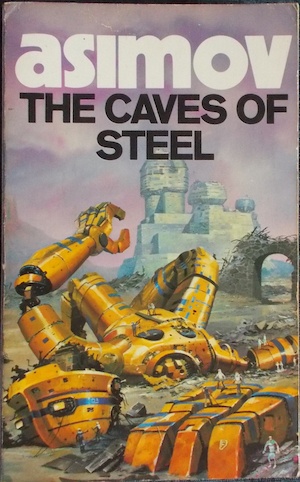
There’s some debate as to whether The Caves of Steel is a science fiction novel or a crime novel, but really it’s both. In writing this futuristic detective story, Isaac Asimov set out to prove that science fiction principles can be applied to any literary genre, and he certainly succeeded masterfully in doing just that. Roughly 3000 years in the future, hyperspace travel has allowed humanity to escape the confines of Earth and colonise nearby worlds. There’s considerable conflict between the Spacers, those who live off-world, and those who have remained on Earth, mainly due to the Spacers’ reliance on robotic labour and the Earthers’ inherent distrust of robots.
When Dr Sarton, a Spacer ambassador tasked with convincing the Earth government to loosen its anti-robot restrictions, is murdered with an energy blaster, Detective Elijah Baley is forced to team up with advanced humanoid robot R Daneel Olivaw to track down the killer. While Baley relies on his intuition to identify suspects, R Daneel scans people’s encephalographic waves to see if they are emotionally capable of committing murder. As the case drags on, and despite the existence of the famous Three Laws of Robotics, Baley comes to suspect that R Daneel might actually be the killer, but how could he possibly prove it?
Order now on Amazon or Bookshop.org
The Castafiore Emerald by Hergé
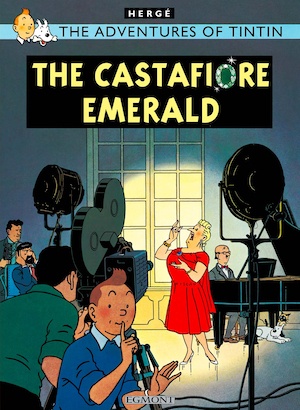
The Castafiore Emerald is the 21st book in Hergé’s The Adventures of Tintin series and, different from the rest of the series, the entirety of the action takes place in Marlinspike Hall, which renders it a country house mystery in the great tradition of the Golden Age of Crime. When Tintin and Captain Haddock help a lost Romani girl find her way home, they find that her family and others in the community are being forced to camp in a rubbish dump. Shocked by the conditions they are living in, Captain Haddock invites them all to camp in the grounds of Marlinspike Hall. Meanwhile, Bianca Castafiore, the famed opera singer and long-term admirer of Captain Haddock, and her retinue arrive at Marlinspike uninvited, which discombobulates Haddock to such an extent that he trips and breaks his leg.
After Professor Calculus gives a confused interview in which he accidently implies that Castafiore and Haddock are engaged, a television crew descends on Marlinspike in the hope of securing an exclusive interview. Chaos soon reigns and, in the middle of it, Castafiore’s maid discovers that her mistress’s most valuable jewel has been stolen. While Detectives Thomson and Thompson are quick to suspect the Romani of the theft, Tintin believes that someone else must be the culprit, although he has to wade through a whole host of red herrings before he finally gets to the truth.
Order now on Amazon or Bookshop.org
Click here to find out which novels got my colleagues on Crime Fiction Lover hooked on crime.








